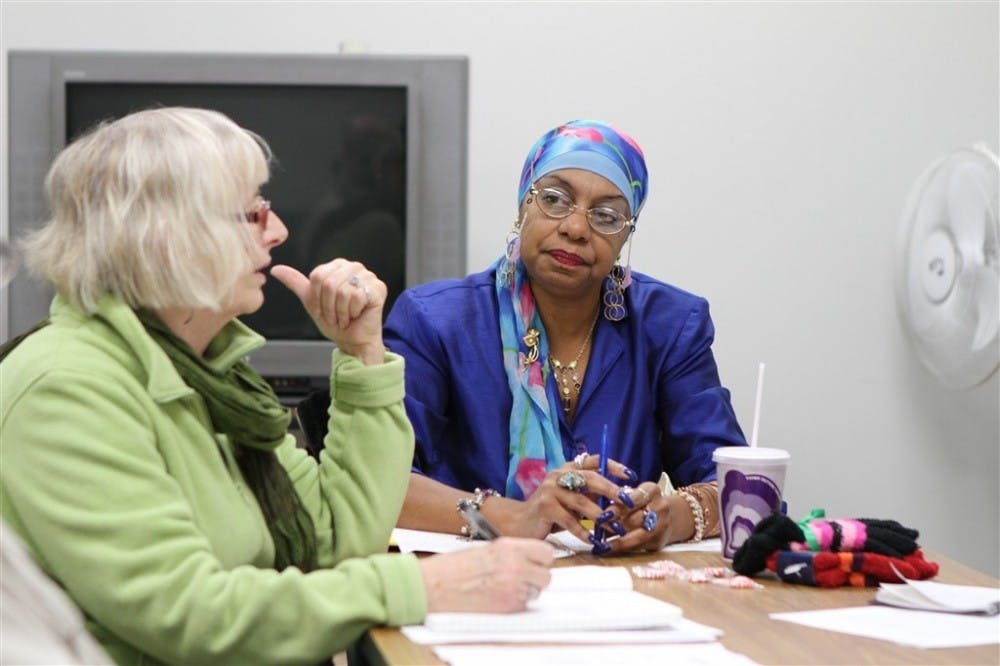The words came from a place of profound understanding, spoken with a quiet assuredness.
"It's about empowering, about giving back what we've lost," she said. "It doesn't matter how low we've gone, we have to get back at a point where we can breathe. I don't know where it starts, I just know it's needed."
Sandra Luckey's words may have been referring to her idea for a hotel for the homeless, but they ring true for the purpose of The Greensboro Voice, a street newspaper co-founded by Elon University senior Mary Yost. Luckey was just one of seven attendees at a recent meeting of the publication at the Interactive Resource Center, a day center for the homeless, in Greensboro.
The staff of The Greensboro Voice is a diverse team of varying ages, interests and lifestyles.
There's Bob Norfleet, a former banker who now helps manage finances for the paper. There's Elizabeth Chiseri-Strater, an English professor at the University of North Carolina at Greensboro, who assists in editing submissions. There are retirees and the former homeless.
What completes this complex family portrait is the rotating staff of current homeless individuals who provide the content — from hand-drawn images of spiders to reflective accounts of experiences with domestic violence to news stories about local amenities for the homeless.
"We've created an odd family, but we're still a family," Yost said. "When we meet every Friday, you would think we wouldn't have seen each other for a year."
Beginning in September of last year, Yost and a small group of volunteers began preparing for the first edition, eventually published Oct. 29. Their writers were gathered from individuals staying in the day center, open daily from 8 a.m. to 3 p.m. And while a handful of that original group has stuck around, Yost said the constantly changing staff is indicative of the nature of homelessness.
"People come and go, it's reflective of not being able to find services," Yost said. "If writers come, it's usually for about two or three editions."
A year later, The Greensboro Voice still solicits writers and story ideas from those seeking temporary shelter at the Resource Center. More than just a paper, Yost said the monthly publication validates the talents of those who are often brushed aside.
"You take for granted that you have the opportunity to get published all the time," said Yost, a journalism major herself. "But if you're not in a college setting or at an internship, it means so much more when you get your name attached to something. You're proud to hand that out to the community."
The ability to empathize with those currently battling homelessness is easier than Yost imagined, having never experienced it herself. The Washington, D.C. native said it was the biggest social issue of her childhood that "hit her in the face every day." And though she views the problem as a fixable one, she realizes it can only be solved with the ongoing collaboration of many agencies over a long period of time.
"Even if I can do nothing but sit and listen, that's all they want sometimes," she said. "It's easier to just relate to people by going in and knowing I'm not there to solve their problems. They want human connections and relationships."
But Yost's approach to homelessness isn't always echoed by her peers, or mainstream society in general. With the motto "printing news that doesn't fit," The Greensboro Voice seeks to fill the void left by the media, which grapples with coverage of the topic.
"The only face you might see is a male in his 30s or 40s sleeping outside or standing on the corner and you think the topic is already covered," Yost said. "It's a solvable problem but one that is hard to digest. It could happen to anyone, especially now. But you don't want to think your neighbor is now out of housing and trying to get back on their feet. It's hard to think about."
But it's a topic the staff thinks the community needs to contemplate. They are looking to drum up more exposure for the paper, which is currently distributed at various locations around the community. Discussions are underway about encouraging local businesses to purchase subscriptions and even allowing homeless individuals to sell it on the streets as a form of self-employment.
Tony Hodges, a single dad for 14 years, has held a steady job for seven years and is pursuing a degree, despite his criminal extensive record. He's hoping his story, planned for an upcoming edition, echoes with others in similar situations, who might feel getting their life on track is a lost cause.
"It's easy when you change yourself," Hodges said at the staff meeting. "People see it. People see the change."
It's stories like Hodges' that are changing the lives of both the writer and the audience, neither of whom might have recognized the skill lying underneath a misunderstood exterior.
"It's a powerful way for people to express themselves when it's otherwise harder to verbalize," Yost said. "It's nice to know your talents are validated, because their talents so often are not when you don't have a home"


